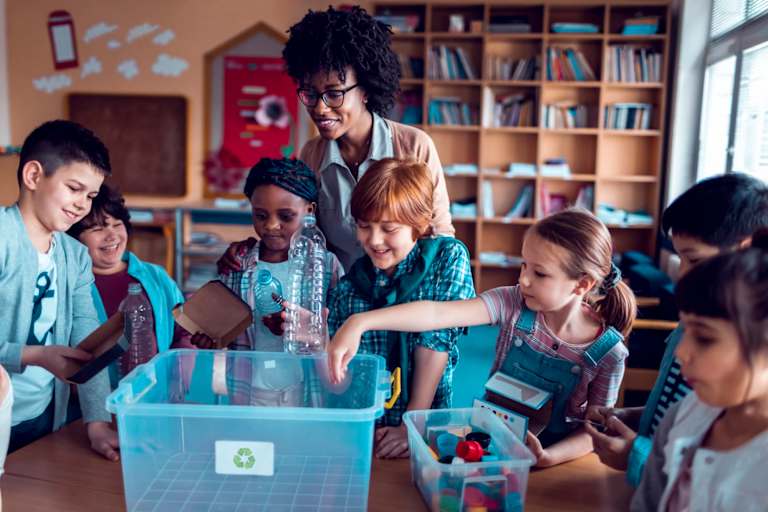Master’s in Child Development Program Guide
Child development professionals are crucial to ensuring that children and adolescents reach their development milestones. These professionals shape children’s social, intellectual, and emotional development through education, healthcare, counseling, and social work. And the field only continues to grow — between 2023 and 2033, the Bureau of Labor Statistics (BLS) projects a 7% job growth for social workers and an 19% job growth for behavioral disorder and mental health counselors. Earning a master’s degree in child development can lead to rewarding and impactful jobs in a variety of different sectors.
What Is a Child Development Degree?
A master’s in child development equips you with the necessary theories and research techniques to succeed. Core courses often focus on physical growth and development in children, language and cognition development, and child and adolescent psychology.
These programs — typically offered as a master of arts or a master of science degree — can also include concentrations such as early childhood development, counseling, education, or healthcare.
The common types of master’s degrees in child development are as follows:
- Master of Arts (MA) in Education
- Master of Science (MS) in Education
- Master of Education (M.Ed.)
These programs typically take two years of full-time study. Still, if you earn your degree online, you can complete your degree faster based on your learning pace, previously earned credits, and work experience.
Master’s in Child Development Degree Courses and Concentrations
The majority of programs comprise 30-40 credits and take two years to complete. Accelerated programs may allow you to graduate in as little as 12 months, while part-time programs could take up to three years to complete.
Master’s in child development programs commonly include courses in child growth and development, programming for child education, child development program administration, and special education.
Programs also often require you to complete a semester-long practicum in an approved setting to meet mandated hours and build hands-on skills.
Common courses in a master’s in child development include:
- Child and Growth Development: This course covers the ins and outs of child development as it pertains to learning. It focuses on the stages of child growth and milestones accompanied by each phase.
- Programming for Child Education: In this course, you’ll learn how to create lesson plans for children in their early stages of life.
- Special Education: In your special education courses, you’ll learn how to most effectively teach young children with learning disabilities.
How to Get a Master’s in Child Development
First things first, to earn your master’s in child development, you need to make sure you meet the minimum requirements to apply.
How Long Does It Take to Get a Master’s in Child Development?
As previously mentioned, a master’s in child development typically takes around two years to complete. However, if you choose to pursue an accelerated degree, you can shorten the time it takes significantly — completing your degree in as little as one year.
Because many students who decide to pursue a master’s degree already work full-time, an online master’s degree in child development can offer flexibility to help students get ahead without leaving their current job.
How to Apply for a Master’s Child Development Program
Master’s programs in child development require you to have a bachelor’s degree from an accredited institution, preferably in a related field. Those with an unrelated degree can still apply if they have relevant work experience or take prerequisites. Consult the checklist below for a full breakdown of what you’ll need to apply.
Application: Most online master’s in child development programs use online college application systems. These applications often require basic demographic information, including personal information and citizenship status.
Test Scores: Many programs will require you to submit GRE scores as part of your application. Some programs may not require test scores, and others will waive the requirement if you have a certain GPA or other relevant experience.
Letters of Recommendation: Programs may also require letters of recommendation, allowing former or current professors, faculty members, or co-workers to endorse you and your readiness for a master’s program.
Resume and Work Experience: Work experience requirements differ among programs; some may look for applicants with relevant work experience, while others may welcome career changers or recent bachelor’s degree graduates. Make sure to include all previous work experience on your resume.
Essays: You may also be required to submit an essay focusing on why you want to pursue a master’s in child development, your post-graduation plans, and why you chose that particular program.
How Much Does a Master’s Degree in Child Development Cost?
The cost of a master’s degree can vary based on field of study, type of institution, and how long it takes to complete. According to data from the National Center for Education Statistics, between 2021-2022, the average cost of a graduate degree from a public college is $12,596, while private colleges cost an average of $28,017.
Public College
$12,596
Private College
$28,017
What Can You Do With a Master’s Degree in Child Development?
A master’s degree in child development can unlock various career opportunities. You can choose from different work environments, too. So whether you want a hands-on role working with children or would prefer a more administrative approach, you can find the right path for you.
Child Development Jobs
With a master’s in child development, you can choose from a variety of jobs to pursue after graduation. Whether you want to work directly with children in a childcare environment or choose to work in a more hands-off approach as an instructional coordinator, you can find the career that works best for you.
While there are 868,000 projected openings in the field over the next decade, the growth for all education and instructional careers is projected to grow slower than the average for all occupations between 2023-2033. The BLS projects a decline in overall employment for kindergarten and elementary teachers.
How Much Money Will You Make With a Master’s in Child Development?
Salary can vary between career, experience, and location. According to the BLS, social workers earn an average annual wage of $59,190, while behavioral specialists earn $60,080 on average. Additionally, speech pathologists make a mean average salary of $92,630, while occupational therapists make $96,790.
| Job | Average Annual Salary (May 2023) |
|---|---|
| Behavioral Specialist | $60,080 |
| Occupational Therapist | $96,790 |
| Preschool or Daycare Administrator | $61,320 |
| Social Worker | $59,190 |
| Speech Pathologist | $92,630 |
What to Consider Before Choosing a Child Development Program
- Flexibility: Online programs can offer several different types of learning formats including scheduled virtual classes over a platform such as Zoom and asynchronous learning you can complete at your own pace.
- Accessibility: Choosing to enroll in an online program eliminates the time you have to commute to and from campus. It also opens the door for you to pursue various online degree programs offered at institutions nationwide without having to relocate.
- Affordability: Studying online can mean paying reduced tuition, even at an out-of-state school. Enrolling in an online degree program also helps you avoid the costs of in-person programs including transportation and on-campus fees.
- Learning While Working: Many online degree programs are structured to allow you to work full-time while earning your degree, allowing you to continue in your current job while working towards leveling up your career.
- Unique Specializations: Online degree programs may offer specialized tracks or concentrations that nearby institutions don’t offer, allowing you to customize your degree based on your particular interests and career goals.



